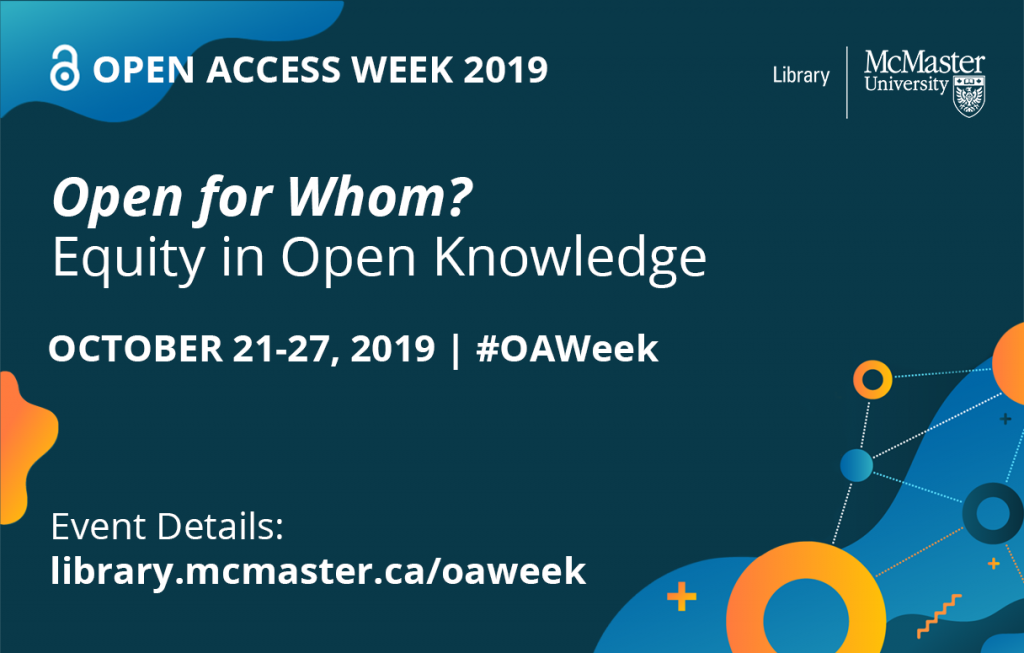Celebrating Open Access, Oct. 22-24

How can researchers avoid predatory publishers? How can Open Science help bridge the innovation gap? How is Open Government making public information more accessible for everyone?
From October 22-24, 2019 join McMaster University Library, the Health Sciences Library and McMaster’s Department of Psychology, Neuroscience & Behaviour for sessions on these and other issues in recognition of International Open Access Week.
An annual global event, Open Access Week (October 21-27, 2019) celebrates advances in Open Access, Open Data and Open Education – all part of a worldwide movement to make scholarly publications, data, and a range of educational resources available, free of legal, financial or technical barriers for the benefit of researchers, students, and society as a whole.
Open Access Week events on campus include:
Predatory Publishing in the era of Open Knowledge: Reducing the Odds of Falling Prey!
October 22, 2:30 – 3:30, Health Sciences Library eClassroom, HSC 2B3 | Presented by Neera Bhatnagar (Head of Systems and Public Services, HSL), Olga Perkovic (Research and Advanced Studies Librarian)
Thinking about where to publish? Do you receive random invitations to submit your work for publications? Don’t get caught publishing in a questionable journal! This session will provide an overview of what predatory or deceptive journals are and offer tips on how to avoid them. Registration not required.
Supporting Research: Equity in Open Government
October 23, 11:30 – 12:30 and 1:30 – 2:30, Mills Library, 1st floor, Connections Room (L113) | Presenters include: Meagan Collins (Information Management Analyst), Paulina Hem (Information Management Analyst), Jacqueline Laing (Applications Analyst) – Federal Economic Development Agency for Southern Ontario / Government of Canada
In this one hour session, we will be reviewing the Open Government Portal (OGP) and briefly discuss the purpose and background behind the initiative, while relating it back to how open information and data can be incorporated into primary research and/or research papers. We will also demonstrate how the OGP functions; explain the services that it provides; and show how faculty and students can access datasets and information. Examples will include projects and applications using open data from the OGP. Bring your own laptop for hands-on learning.
Register or drop-in on one of the sessions. Light refreshments will be provided.
Equity Driven Open Science Policies in Biomedical Research – A New Model for Drug Discovery in Rare Diseases?
October 24, 10:30 – 11:00, Mills Library, 1st floor, Sherman Centre for Digital Scholarship | Presented by Dr. Rachel Harding (Huntington’s disease research team leader at the Structural Genomics Consortium, University of Toronto)
Drug discovery too often focuses on the bottom-line rather than on the people who the development of new medicines might benefit, or the other stakeholders in the research process. Self-serving and conservative approaches to biomedical research have left an innovation gap, so many disease communities have unmet therapeutic needs, in particular rare disease populations. I will argue that open science policies can better serve these stakeholders and innovative intellectual policies can help develop a more equitable drug discovery process which benefits those in need, not just shareholders.
11:00 – 12 noon | This presentation will be followed by a panel discussion on open science with faculty panelists Dr. David Feinberg (Associate Professor, Dept. of Psychology, Neuroscience & Behaviour) and Dr. Harding and graduate student panelists Aadil Bharwani (MD-PhD candidate, Dept. of Medicine) and Mike Galang (PhD candidate, Dept. of Psychology, Neuroscience & Behaviour)
Registration not required. Light refreshments will be provided.
Institutions and funding agencies around the world are adopting Open Access and Open Data policies that encourage researchers to make their scholarly work, including research data, freely available online in an open access journal, or a repository such as McMaster’s institutional repository, MacSphere. Learn more about how McMaster University Libraries support Open Access.


